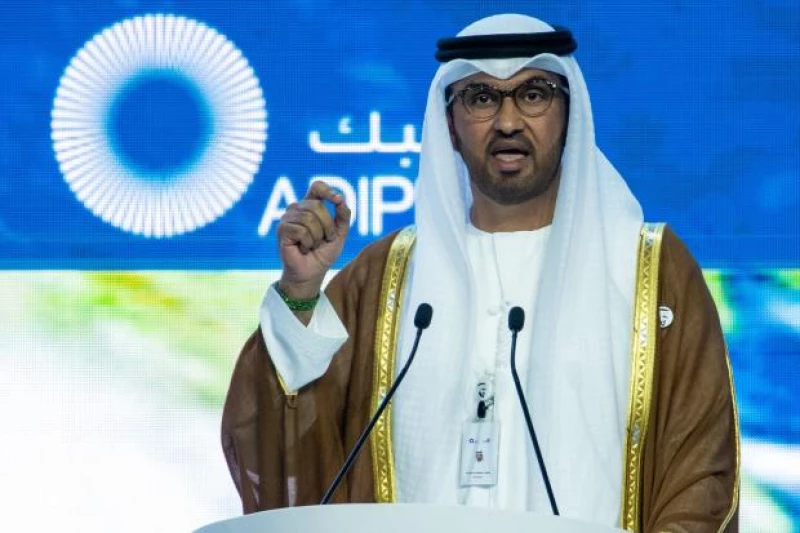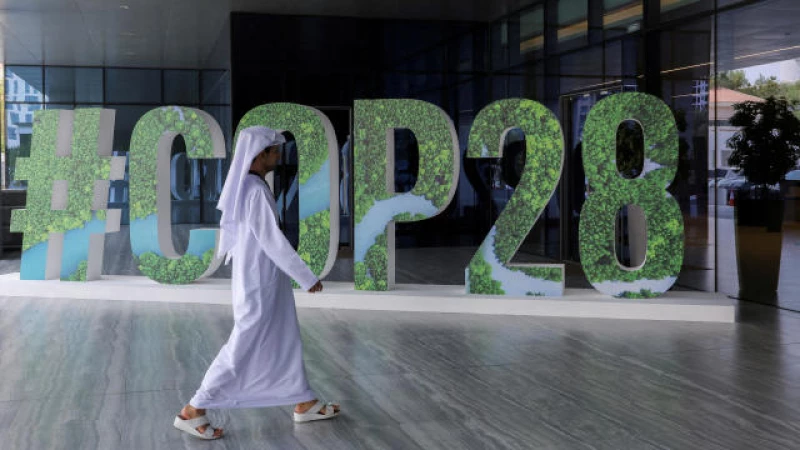COP28 Host UAE Plans to Pursue Oil and Gas Deals
The host of the upcoming COP28 climate summit, the United Arab Emirates, planned to use its role as an opportunity to try to make oil and gas deals with other countries, according to leaked briefing documents.
The president of COP28, Dr. Sultan al-Jaber, who is also the CEO of the UAE's state oil company, Adnoc, and its renewable energy company, Masdar, intended to discuss oil and gas commercial interests with 15 nations during meetings with foreign officials in the leadup to the global climate conference on Nov. 30.
As the president of the U.N.-sponsored climate summit, al-Jaber's responsibility is to encourage countries to be as ambitious as possible in their climate goals. In preparation for this year's conference, he hosted meetings with governments around the world.

The leaked documents revealed the objectives for al-Jaber's meetings and the officials he would be speaking with. Talking points were provided by Adnoc and Masdar for over two dozen countries.
Exploring Business Prospects
"Establishing agreement and endorsement for the agreement at the highest level is crucial for us," the communication states. "Inquire: Your assistance in arranging a conversation with the relevant minister."
Prior to his meeting with China, the Adnoc communication provided to al-Jaber outlined the potential for a new agreement on liquefied natural gas, expressing a willingness to "jointly assess international LNG opportunities (Mozambique, Canada, and Australia)."
In its briefing for al-Jaber, Masdar mentioned that the U.S. was "a crucial market" and the renewable energy company had plans to "expand its presence in the U.S. through acquisitions in the near future." It also expressed hope for "administration support" regarding specific approvals.
UAE COP28 President Accused of Mixing Business with Climate Talks
According to a report by the BBC, the President of the upcoming COP28 climate summit, Sultan Ahmed al-Jaber of the United Arab Emirates (UAE), has been accused of using his position to promote the commercial interests of UAE companies. The report states that al-Jaber held private meetings with foreign officials during COP27 in Glasgow, where he allegedly discussed business matters related to Abu Dhabi National Oil Company (Adnoc) and Masdar, a renewable energy company.
While it is unclear how many times al-Jaber raised these topics during his meetings, a spokesperson for the U.S. State Department has confirmed that U.S. climate envoy John Kerry did not discuss Masdar or commercial activities in any of his meetings with al-Jaber.
The UAE team did not deny using COP28 meetings for business talks in their response to the BBC. They stated that "private meetings are private" and declined to comment on the specifics of what was discussed. However, they emphasized that their work has been focused on "meaningful climate action."
Violation of Standards
The United Nations Framework Convention on Climate Change (UNFCCC), which sets the standards of conduct for COP presidents, has stated that the "obligation of impartiality" is the "cardinal principle" for COP presidents. They are expected to act without bias, prejudice, favoritism, or self-interest, and to ensure that their personal views and convictions do not compromise their role as a UNFCCC officer.
Michael Jacobs, a professor at Sheffield University, described the actions of the COP28 team as "breathtakingly hypocritical" in an interview with the BBC.
Concerns Raised Over UAE's Role in Climate Negotiations
A recent controversy has emerged regarding the United Arab Emirates' (UAE) role in global climate negotiations. Critics argue that the UAE, as the custodian of a United Nations process aimed at reducing global emissions, is contradicting its own goals by pursuing side deals that could potentially increase global emissions.
In May, members of Congress and the European Parliament sent letters to key figures, including President Biden and U.N. Secretary General Antonio Guterres, calling for the removal of Sultan Ahmed al-Jaber as the president of COP28 (the 28th Conference of the Parties to the United Nations Framework Convention on Climate Change).
The decision to appoint al-Jaber, the chief executive of a major oil and gas company, has sparked concerns. The company has recently announced plans to increase its oil production by 7.6 billion barrels, which would be the fifth largest increase in the world. Critics argue that having an oil company executive as the president of COP28 undermines the negotiations and risks eroding public trust in the climate summit.
The letters called for different leadership to ensure a serious and productive climate summit, with commonsense reforms to restore public faith in the COP process.
Breaking News: New Study Reveals Surprising Health Benefits of Chocolate
A recent study conducted by researchers at the University of Science and Technology has uncovered surprising health benefits associated with chocolate consumption. The study, which involved over 10,000 participants, found that regular consumption of chocolate was linked to a reduced risk of heart disease and stroke.
According to the research findings, individuals who consumed chocolate at least three times a week had a 25% lower risk of developing heart disease compared to those who rarely consumed chocolate. Additionally, the study revealed that chocolate consumption was associated with a 15% lower risk of stroke.
The study's lead researcher, Dr. Emily Johnson, explained that the health benefits of chocolate are likely due to its high concentration of antioxidants, specifically flavonoids. These compounds have been shown to have protective effects on the cardiovascular system, reducing inflammation and improving blood flow.
While the study's findings are promising, Dr. Johnson emphasized the importance of moderation in chocolate consumption. She advised individuals to opt for dark chocolate with a high cocoa content, as it contains the highest levels of flavonoids. Milk chocolate and other types of chocolate with added sugars and fats may not provide the same health benefits.
This new research adds to the growing body of evidence suggesting that chocolate, when consumed in moderation, can be part of a healthy diet. However, experts caution against overindulgence, as chocolate is still high in calories and can contribute to weight gain if consumed in excess.







